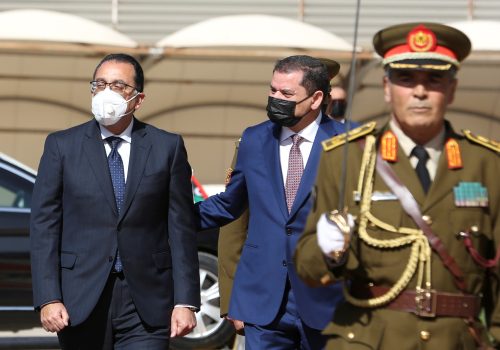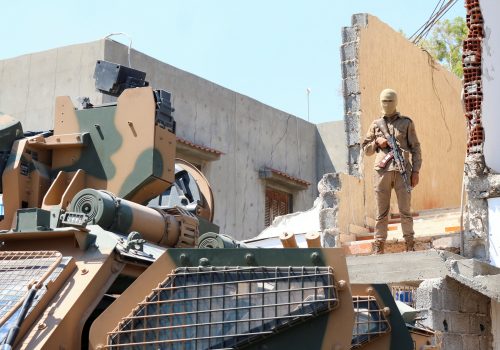The Derna catastrophe is a sign that the international community needs to take action in Libya
Judging by the relentless media coverage and official inquiries, it would be natural to deduce that the tragic events on September 10 in the flood-ravished eastern Libyan city of Derna, with its destruction and heavy death toll of more than eleven thousand, was a catastrophe aggravated by the collapse of two dams that were decades old. This outcome results from a combination of factors converging to produce the visible consequences seen today. With that in mind, discussing what transpired in Derna within a broader geographical and political context is crucial.
Focusing solely on the Mediterranean Sea area provides sufficient grounds to draw some conclusions. Natural disasters are abundant in this region—including devastating earthquakes, torrential rains, and tornadoes—occurring frequently enough to establish a recurring pattern that is undoubtedly caused by climate change. In each of these disasters, the response from Mediterranean governments progresses through various phases. Phase one involves assessing the event, determining the extent of the damage, and conducting necessary activities to save lives and provide relief to the distressed population. The second phase involves assigning blame. In the case of the coastal city, Derna, under whose responsibility did preventing such a cataclysmic aftermath fall? Who is answerable for the flooding that affected the city so severely? Why were there no protocols regarding a building’s location and why were dam repairs neglected, among other factors?
Statistically and historically, this second phase has seldom led to meaningful accountability in the countries surrounding the Mediterranean Sea. Responsibilities have been attributed rarely, if ever, and the norm has been that no one is deemed guilty. One example is the 5.9 magnitude earthquake that hit Egypt in 1992, causing massive damage and over 370 deaths. Poor construction caused many of the buildings to collapse, and the government response was next to nil primarily due to corruption. If anyone receives blame, it is typically past officials and politicians who are either deceased or incapacitated.
Eventually, the third phase kicks in, focusing on reconstruction and rebuilding. At this point, the ruling elite no longer perceives phase two as a risk, allowing them to divert funds allocated for this phase, which leads to corruption, poor governance, and cronyism. Phase four aims to push the entire event into oblivion, preventing public opinion from demanding effective justice and reparations despite the preceding scandals, as evident with the 6.7 magnitude earthquake that hit Algeria in 2003 and killed more than four hundred. At the time, the quake eroded public confidence in the Algerian government because of corruption and because no one had been held accountable.
This pattern has repeated itself in the area for almost every natural calamity over at least the past two centuries. The tragedy of Derna is likely to follow suit. General Khalifa Haftar, who controls Eastern Libya, has already visited Derna on September 15, announcing immediate reconstruction plans, assistance for the injured, and support for displaced persons, thus, presenting himself as the city’s savior. However, it’s widely known that, in 2017, during Haftar’s campaign to eliminate Islamists from Libya—believing Derna to be a hotbed of such groups—he subjected the city to a year-long siege and, in 2019, to heavy bombardment and military incursions.
A key difference in the case of Derna sets it apart from others. In the last century, the disasters that struck Mediterranean countries—for example, Egypt, Greece, Italy, Morocco, and Turkey—occurred in countries with legitimate governments—or even authoritarian ones—that had the capacity and willingness to act. Despite corruption and poor governance, the international community played little to no significant role in offering aid in these cases. The case of Derna may differ. In short, the tragedy of the dam collapse results from neglected dam maintenance, city infrastructure, and civil services, such as inadequately trained and equipped firefighters and medical personnel, the absence of a warning system, and numerous other issues.
While this situation can be traced back to dictator Muammar Gaddafi’s rule, the degree of neglect and mismanagement contributing to the current events can be primarily attributed to Haftar’s authoritarian rule and the duplicity of the House of Representatives (HoR) leadership. The latter claimed to serve the people but played a destructive role in administering eastern Libyan cities. While the official government in Tripoli cannot be directly blamed, it bears a significant responsibility due to its unwillingness to resolve divisions with the eastern component nor provide a model of good governance. This lack of legitimate governance sets Derna’s case apart from others in the region.
Libya lacks a government with legitimate—through free and fair elections—and effective authority. Coupled with the widespread discontent among the population, this offers an opportunity for the international community or a limited number of states with stakes in stabilizing Libya—such as Egypt, Turkey, and Algeria—to act decisively. Their intervention could deprive the current illegitimate actors of authority and propose a solution that involves empowering individuals of high moral standing and international institutions overseeing the devastated populations. The goal would be to establish a government solely focused on managing the emergency and preparing the country for elections. This intervention should not necessarily be through military means. Instead, it should consist of pressures by on-the-ground military actors to push for a solution that guarantees a change of government and a new direction for adopted policies.
This narrow window of opportunity is unlikely to remain open for long. Taking this honest, effective, and decisive action for the benefit of the general Libyan population—rather than the “pragmatic” approach of dealing with the existing powers, as seen in the Italian government’s policy of reliance on the Abdul Hamid Dbeibah government in Tripoli and Haftar in the east—would be considered a positive step. It’s time for European governments to understand that said “pragmatic” approach—one that is centered on dealing with any individual power based on its governance qualities—will only lead to more disasters and be unlikely to succeed.
Karim Mezran is director of the North Africa Initiative and resident senior fellow with the Rafik Hariri Center and Middle East Programs at the Atlantic Council.
Further reading
Thu, Feb 2, 2023
Egypt just seized part of Libya’s maritime zone. What’s the story behind the Egyptian decree no one is talking about?
MENASource By Ali Bakir
On December 13, 2022, Egypt's President Abdel Fattah El-Sisi issued a presidential decree demarcating the country's maritime borders with Libya.
Wed, Feb 1, 2023
Libya’s political impasse and the $6 billion question
MENASource By Alia Brahimi
On January 5, after months of talks brokered in Egypt, Libya’s rival legislative bodies finally agreed to begin discussions to develop the constitutional basis for elections.
Tue, Nov 15, 2022
A moment of opportunity: Can the UN’s new special representative for Libya break the country’s cycle of devolution?
MENASource By Emadeddin Badi
After two months into the job, Abdoulaye Bathily may be quickly realizing that Libya’s war never abated, and that it is now simply fought by other means in the halls of the United Nations and corridors of foreign capitals.
Image: Hamdi Cheikh, who survived the deadly storm that hit Libya, reacts he speaks to journalists in Derna, Libya September 21, 2023. REUTERS/Zohra Bensemra


